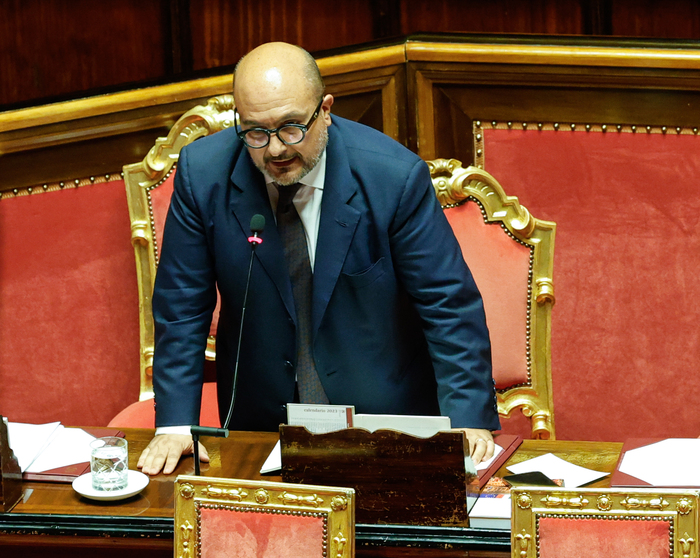Shoah Museum: Senate Gives Green Light to Landmark Project
Editor’s Note: The Senate has just approved funding for a long-awaited Shoah Museum. This article delves into the significance of this decision and its implications.
Why This Matters: A Monument to Remembrance and Education
The Senate's green light for the Shoah Museum marks a pivotal moment in Holocaust remembrance and education. This project is not merely a building; it's a testament to the victims, a powerful tool for education, and a crucial step in combating antisemitism and historical revisionism. The museum will serve as a vital resource for researchers, educators, and the public, ensuring the horrors of the Holocaust are never forgotten. Keywords: Shoah Museum, Holocaust Museum, Holocaust Remembrance, Senate Approval, Antisemitism, Historical Revisionism, Education.
Key Takeaways
| Feature | Description |
|---|---|
| Senate Approval | The Senate has officially approved funding for the Shoah Museum project. |
| Significance | This marks a major step forward in Holocaust remembrance and education. |
| Impact | The museum will be a vital resource for research, education, and combating hate. |
| Funding | Details about the allocated funding and its sources are still emerging. |
| Timeline | The construction timeline and projected opening date will be announced soon. |
Shoah Museum: A Beacon of Remembrance
The approval of the Shoah Museum is incredibly relevant in today's context, where historical denial and antisemitism are sadly on the rise. The museum will serve as a powerful counter-narrative, offering a meticulously documented and emotionally resonant experience.
Key Aspects:
- Comprehensive Exhibits: The museum will house a vast collection of artifacts, documents, and personal testimonies, offering a comprehensive overview of the Holocaust.
- Interactive Learning: Interactive exhibits will engage visitors of all ages, fostering a deeper understanding of the historical context and human impact.
- Educational Programs: The museum will offer educational programs for schools, universities, and community groups.
- Research Center: A dedicated research center will support scholars and researchers working on Holocaust-related topics.
- Memorial Space: A dedicated space will serve as a solemn memorial to the victims of the Holocaust.
Interactive Elements: Personal Stories from the Shoah
This section will feature personal stories from survivors, victims, and rescuers. This will include powerful testimonies and multimedia elements to create an emotionally engaging and informative experience. The goal is to humanize the history and make it relatable to a broad audience.
Interactive Elements: The Role of Bystanders During the Holocaust
This section will analyze the role of bystanders during the Holocaust, exploring the complexities of moral choices during times of extreme pressure. It will discuss the different responses, highlighting both acts of heroism and the failures of conscience, providing a crucial context for understanding the events. Factors such as fear, apathy, and societal pressures will be examined in detail.
People Also Ask (NLP-Friendly Answers)
Q1: What is the Shoah Museum?
A: The Shoah Museum is a planned museum dedicated to documenting and commemorating the Holocaust, offering a powerful educational experience for visitors of all ages.
Q2: Why is the Shoah Museum important?
A: It's crucial for remembering the victims, educating future generations about the dangers of hate and intolerance, and combating historical revisionism.
Q3: How can the Shoah Museum benefit me?
A: It will offer a powerful learning experience, helping you understand a pivotal moment in history and fostering empathy and tolerance.
Q4: What are the main challenges with building the Shoah Museum?
A: Challenges may include securing funding, collecting and preserving artifacts, and creating exhibits that are both informative and emotionally resonant.
Q5: How can I support the Shoah Museum?
A: You can support the museum by donating, volunteering, or spreading awareness about its mission.
Practical Tips for Learning About the Holocaust
Introduction: Learning about the Holocaust can be challenging, but it's essential. These tips will help you approach the topic with sensitivity and gain a deeper understanding.
Tips:
- Visit Museums and Memorials: Engage with firsthand accounts and artifacts.
- Read Survivor Testimonies: Hear the stories directly from those who experienced the Holocaust.
- Watch Documentaries: Explore the historical context and personal experiences.
- Read Books and Academic Works: Develop a comprehensive understanding of the events.
- Engage in Discussions: Share your learning and exchange perspectives with others.
- Support Holocaust Education: Advocate for educational programs in your community.
- Challenge Antisemitism: Speak out against hate speech and discrimination.
- Remember the Victims: Keep their stories alive and honor their memory.
Summary: These practical tips will help you engage with the history of the Holocaust thoughtfully and respectfully.
Transition: The Shoah Museum's creation is a critical step in these efforts.
Summary (Résumé)
The Senate’s approval of the Shoah Museum is a momentous occasion. This museum will serve as a powerful educational tool and a lasting memorial, combating antisemitism and ensuring that the lessons of the Holocaust are never forgotten.
Closing Message (Message de clôture)
The Shoah Museum represents hope in the face of unimaginable tragedy. It's a testament to the enduring power of remembrance and the importance of fighting intolerance. Let us ensure that this project becomes a beacon of light, guiding future generations towards a world free from hate.
Call to Action (Appel à l'action)
Learn more about the Shoah Museum and how you can support its mission. Share this article to spread awareness!
(Insert Hreflang tags here for multiple languages)

